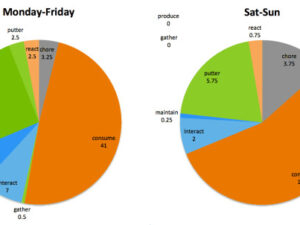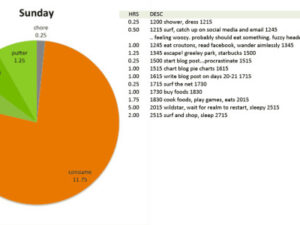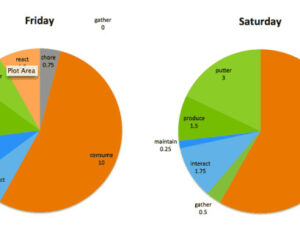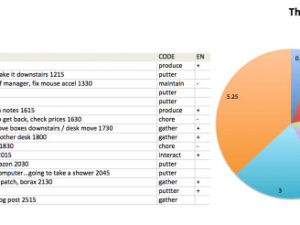(last edited on August 17, 2017 at 4:09 pm)
I’ve been thinking a lot lately about the huge amount of time I spend ingesting information versus the amount of time spent actually synthesizing it into new things. That’s the point, isn’t it, of having the freedom to create? And yet, I don’t seem to be making very much, or not making as much as I could be.
Normally, I am one to ignore the “you should do more” voice in my head, determined to take my time and enjoy the process as much as possible. It’s really hitting me, though, that I’m not really enjoying the process; this quote from Jeffrey Gaffney, the executive producer of an online video game I’m playing called Wildstar, made for a good reminder (emphasis mine):
If there is a fun thing to do that is inefficient and a horribly boring thing like smacking yourself in the face with a shovel next to it that gives more XP, players will do more XP. They’ll try the fun thing once or twice but then go, ‘No, I can’t help it. I need to hit level 50. I want my end goal more than I want my journey.’ So it’s very easy to have the journey trivialized.
Achievement is the love of watching bars grow — that’s our industry. I don’t think there’s a more fundamental human need that gets tapped into by these games than watching your bars advance, and that feeling of progression — of being able to say, ‘I am tougher than I was before.’
Progression. Accomplishment. Bars growing. Such is the power of video games, and it’s a good example of the false sense of accomplishment that comes from consuming someone else’s content. Games, with their immediate feedback to our simplified inputs to a system of challenge and progression for enjoyment, are right at the top of the chain. I just spent the weekend playing WildStar, and now I am playing a blue cat wearing a trucker hat riding a giant bird around a floating plot of land in the sky next to my rocket house and garden:
 I had a good time, I think, but not a lot else got done other than completely relaxing into the flow of the game. Today, I am ready for something else. So for June, I’m going to make this a month of balancing consumption with production; that is, I’m going to try to make something new every day.
I had a good time, I think, but not a lot else got done other than completely relaxing into the flow of the game. Today, I am ready for something else. So for June, I’m going to make this a month of balancing consumption with production; that is, I’m going to try to make something new every day.
This challenge is similar to my New Product Every Day challenge last February, but I’m going to make some changes.
- Instead of tracking my time using the 15-minute ritual, I want to track how much time is spent either producing, consuming, learning, and maintaining. I’ll probably adapt my Emergent Task Timer for this purpose.
- The reason I want to track time in this way is to just see where it’s all going, and discover how this correlates with how I feel.
- I’d also like to try to make incremental progress and learn to be OK with it.
- I’m not going to worry about goal tracking for now. It’s tempting to want to tie every bit of effort toward a long-term goal, but frankly this is kind of exhausting, and I’d like to spend less time doing that. My personal goal is not to be super-efficient with my tasks, but to savor them as I produce works that have great utility and value to me, with the emphasis on producing.
I just want to see where the time goes for a while, and see if by being mindful of shifting the balance from consumption into production makes a different. I suspect the practice of daily review will lead to naturally lead to (possibly fleeting) productive change, because practicing ANY system creates mindful engagement. I don’t think it really matters what that system is—GTD, Zen To Done, 7 Habits, 12 Step, Four Agreements…they are all creating focus and mindfulness. Some have built-in support systems, while others have built-in tools and procedures to follow, but none of them work unless you’re on the ball.
Here goes!






5 Comments
Hey Dave, somewhat related– a few months back, decided to try a few experiments to reduce consumption that ended up working out well. 1) I removed ‘interruption apps’ from phone (Facebook, etc). 2) I now keep my phone on silent mode 100% of the time. I initially started with just weekends. I liked it so much, I throttled up to 100% of the time. Overall, results showed my initial fears of missing an enlightening ping, beep, twizzle, clang, etc. were greatly exaggerated ;-).
Bill: Thanks for sharing that datapoint! Next time you’re in a social break, I’m looking forward to learning more!
I’ve been working on this too, trying to create new habits (sometimes with great success, sometimes with less. I was greatly inspired by a book by a Norwegian social anthropologist (“Tyranny of the moment: On fast and slow time in the information society”) and have worked with changing my habits (“life hacks”) for a couple of years, see for example:
Me and my equally nerdy colleague have also worked for a couple of years trying to help our students procrastinate less and establish better studying habits (http://danielpargman.blogspot.com/2013/12/do-it-now-on-our-new-procrastination.html).
Cheers!
/Daniel
Daniel: Thanks for providing your links! Sounds like we are of a similar mindset. Maybe someday I will be able to travel to Norway and meet you guys in person to compare notes! One quick note about watching more TED talks: I’ve been finding the TED RADIO HOUR podcast a nice way to get immersed in topics. It’s actually, in some ways, better than watching the complete TED talks themselves. If you have already stumbled upon this program, it’s worth checking out.
Norway is nice but I’m actually at the Royal Institute of Technology in Stockholm, Sweden :-)
But do get in touch if you happen to pass by!
/Daniel